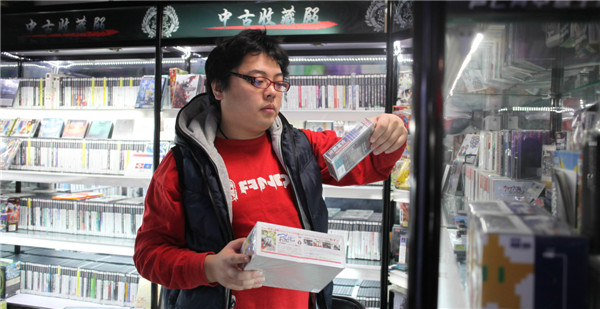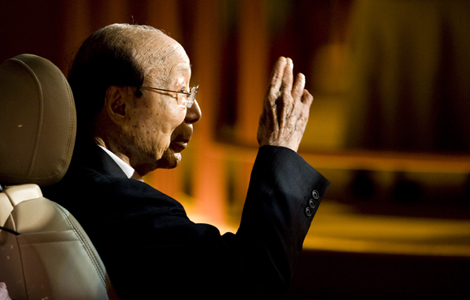Gamers still eager to try their hands at Legal Minefields
Updated: 2014-01-17 09:31
By Eric Jou, Yang Yang and Yang Wanli in Beijing (China Daily)
|
|||||||||||
 |
|
A buyer looks for favorites at a video games stall in Beijing's Soshow shopping mall. Wang Jing / China Daily |
"They (Chinese gamers) didn't even realize the ban affected them," said Hanson. "They didn't have the choice of playing on consoles legitimately."
She said the ban resulted in a lack of revenue for the industry because off-the-book sales generated no tax revenue for the government, leaving hardware and software makers unable to track the number of units sold. The researcher estimates that the Chinese video-gaming industry raked in around $12 billion in 2013. However, most of that came from sales of online computer games and very little from consoles.
Hanson believes that opening the market would be a good thing. "It goes back to movies, it goes back to books. Content is king," she said. "Assuming the console games approved for use in China are fun, have good game play and are suitable for the market, why wouldn't they be successful?"

She added that there could also be a knock-on effect in terms of expansion of the domestic market. Indeed, one of the first moves came on Wednesday when the Chinese telecom-equipment giant Huawei Technologies announced that it will likely make its in-house console available in China in the second quarter of the year.
"I have a feeling that a lot of these outsource game-development studios, which exist in China for reasons of cost-cutting (by overseas companies) and have served the international market for so long, have a lot of knowledge. Coupled with demand from domestic hardware makers and gamers, they will probably have the ability to develop Chinese games with Chinese themes appropriate for the market," said Hanson. "You can see this in mobile games, certain games are in demand by Chinese gamers."
A communal affair
Wang Jing, a console-game designer in Tokyo, said the pastime was never regarded as a bad thing among regular Chinese people. For her, playing alongside her cousin, it was a communal affair.
"When I was little, my parents wanted me to play piano. They had me enrolled for lessons and everything, and that didn't give me much time to play games. On top of that, my family would never buy a console, so I ended up doing all of my early gaming either at my cousin's house or at a neighbors," she said, adding that the ban neither deterred nor encouraged her to play.
Later, she developed a love of art and devoted much of her time to drawing and painting, but she never gave up playing video games.
"Online games are cool, I play a lot of them from various parts of the world," she said. "However, a lot of things have been banned, blocked or access has been restricted, but that hasn't stopped people from getting hold of them."
Her fascination with art and video games left her dreaming of finding a job in the gaming industry. Eventually, the dream became reality and she spent seven years working for Square Enix, one of the world's best-known developers, manufacturers and distributors of video games.
Zhao, 28, who works in the garment and fashion industry, was first introduced to video games at the age of 6.
"Back then, when game systems first entered China, everyone was curious about the devices and there wasn't any really negative press or bad connotations associated with them," said Zhao. "The phrase 'digital opium' hadn't been coined back then."
That was to change, though, and in the run-up to the ban on consoles, media reports constantly savaged video-game playing as a "negative" pastime, one that was considered addictive and harmful to the growth of adolescents.
Zhao remembers playing Tetris or Circus Charlie with his parents and grandparents prior to the ban, but his parents and teachers rapidly changed their attitudes towards video games. Coincidentally this was around the time that online multiplayer games became extremely popular in China.
"It's true. Video games are very addictive and can take up a lot of time and energy, I used to stay up all night playing," said Zhao. "Then I got really hooked on online games - they have a social aspect."
"Maybe if I hadn't played games, I would have done better in the college entrance exams," he said.
Despite the ban, Zhao continued to play and the passion remains, so much so that, along with some friends, he started Gadio, one of China's most popular podcasts about video games.
The possible lifting of the console ban doesn't excite Zhao. For him, the most exciting thing is the possibility of localized versions of popular games that are currently not offered in simplified Chinese characters.
For older gamers, such as Zhao, who grew up before and after the ban, the best parts of gaming are the bonds of friendship made and the memories evoked.
"I have a friend from childhood; we grew up together and we used to game a lot together," said Zhao. "Now, every time we meet up we get together to play on an old Sega Genesis console at my home or his. It's a way of reliving our childhoods."
Contact the authors at Ericjou@chinadaily.com.cn, yangwanli@chinadaily.com.cn and yangyangs@chinadaily.com.cn
Related Stories
China suspends ban on foreign video game console sales 2014-01-07 17:29
Today's Top News
China draws a step closer to balanced flows
Xinjiang doubles terror fight budget
China bulks up maritime fleet
Lunar probe sets out on new missions
Russia battle militants before Olympics
Hollande responds to affairs reports
China and Italy agree to boost cooperation
Party school official suspended after scandal
Hot Topics
Lunar probe , China growth forecasts, Emission rules get tougher, China seen through 'colored lens', International board,
Editor's Picks

|

|

|

|

|

|





